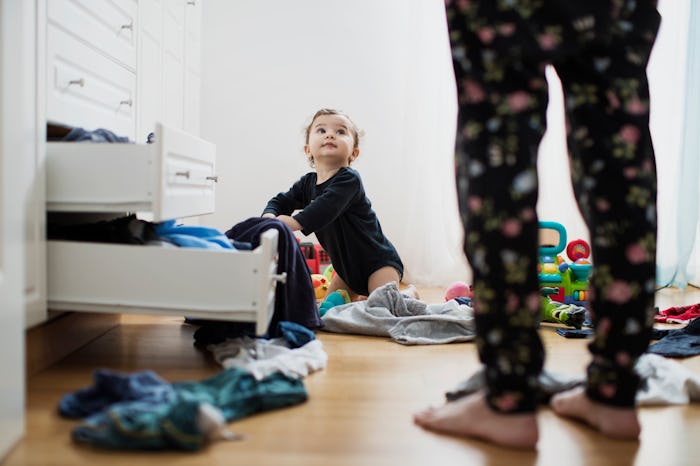Life

OK, There's Actually A Pretty Cute Reason Why Your Baby's Obsessed With Drawers
Everyone says babies are messy, but hahaha, you were absolutely expecting that in the form of smushed food and spit-up. But taking out every item from your dresser drawers and littering the floor? Not so much. Why do babies love drawers? It's a pretty simple concept — opening and closing a drawer — but to a baby, there is something just magical about this action that has them enthralled with doing it over and over again.
"Kids start being fascinated with drawers and cupboards as their problem-solving skills begin to increase," Dr. Natasha Burgert, a pediatrician practicing in South Overland Park, Kansas tells Romper. "Typically by 9 months, babies begin to understand that even though something is not currently visible, it still exists. This is called 'object permanence.' In this early stage of drawer play, they are essentially playing a game of 'peek-a-boo' with themselves, testing this concept."
Cue a collective "aww" from every mom (myself included) who just realized that their baby is playing peek-a-boo all on their own when they open and close drawers. Could this be any more adorable? The answer of course is a resounding "yes," because not only are they playing a game all on their own, but they're actually learning while they do it.
"[Playing with drawers] is a great way for babies to explore what’s around them. It helps them experience things tactilely or through touching different textures," Dr. Michael Zollicoffer, pediatrician at Herman & Walter Samuelson Children’s Hospital at Sinai Hospital of Baltimore tells Romper. "This can be the drawers themselves, the handles on the drawers, and/or what’s inside them. It’s also how babies check out things when they are outdoors and they pick up sticks and stones to see what they feel like."
When your little one is playing with drawers, Dr. Burgert explains that your budding baby physicist is also testing out the basic principles of how things work. "Babies are increasingly curious about their environment and their ability to control it. Moving objects independently is one way to practice this curiosity and naturally learn constructs such as motion and gravity," she says.
Although it might seem counterintuitive to let your baby destroy your sock drawer or empty the contents of your Tupperware drawer all over your kitchen floor, the fact that they're learning through these actions means that encouraging the behavior could be beneficial in the long run. Plus, it's just extremely adorable to watch and know that they're actually growing and learning right in that moment. Keeping your baby safe while they explore their beloved drawers isn't hard to do, but it may take some work on your end.
"One of the best ways to keep babies safe is to be there with them while they are exploring — and enjoy the experience. That is important to keep them from climbing inside the higher drawers where they may fall and bang their heads or to keep them from putting things they shouldn’t inside their mouths," Dr. Zollicoffer tells Romper. "Another good way to keep them safe is to distract them with other safer options, such as playing with a shoe box, putting things inside it, and letting children open and close the lid to it rather than the drawers."
Basically, go ahead and let your baby explore, but make sure to take the proper precautions in order to allow them to fully engage and continue developing their sense of place in the world and learn how things work.
"Babies need a safe place to explore and have free play. This requires gentle supervision because free exploration often comes with natural consequences and mistakes (pinched fingers) that help baby explore their world," Dr. Burgert tells Romper. "When a child's environment is completely restricted, they do not have a chance to explore the limits of their environment. Common sense rules always apply."
Experts:
Dr. Natasha Burgert, pediatrician based in South Overland Park, Kansas
Dr. Michael Zollicoffer, pediatrician at the Herman & Walter Samuelson Children’s Hospital at Sinai Hospital of Baltimore